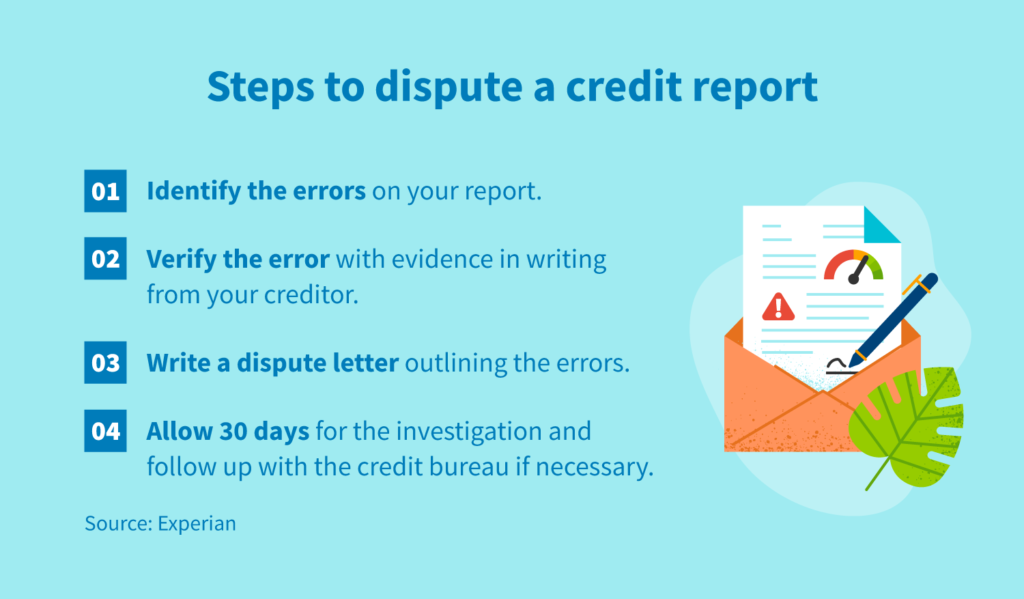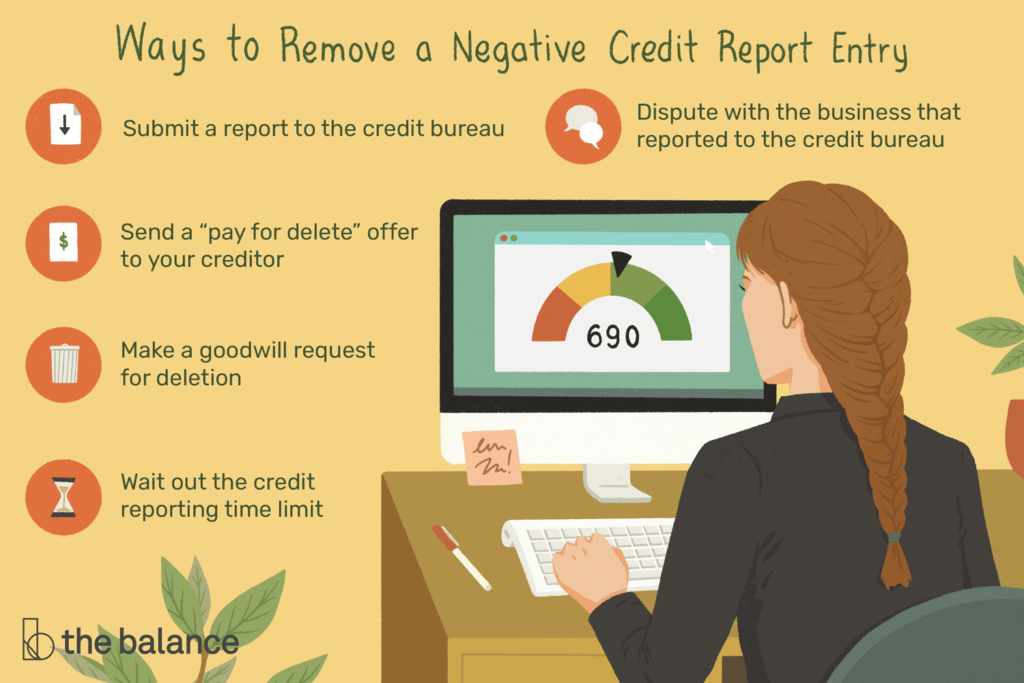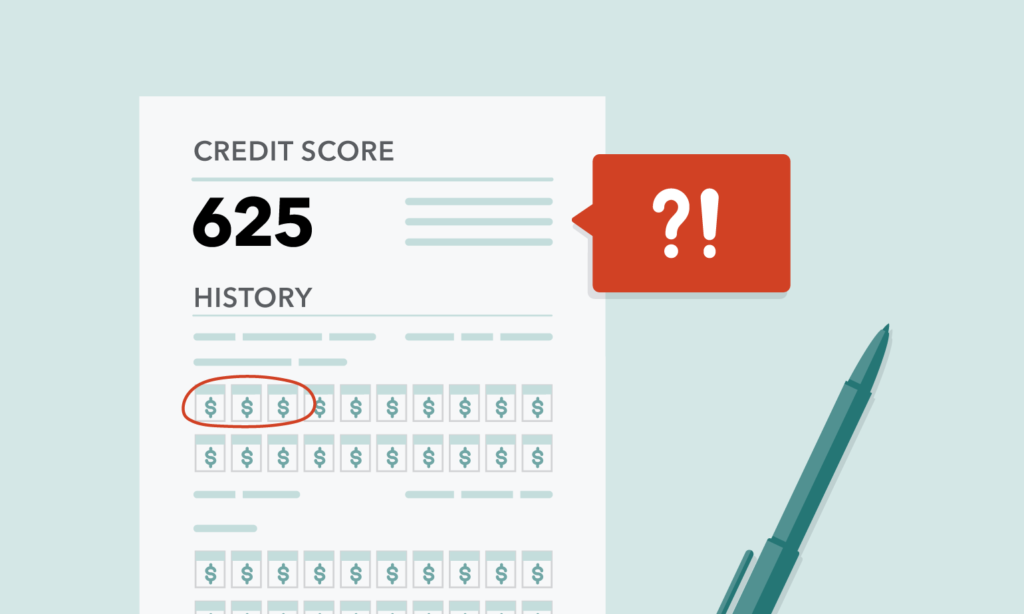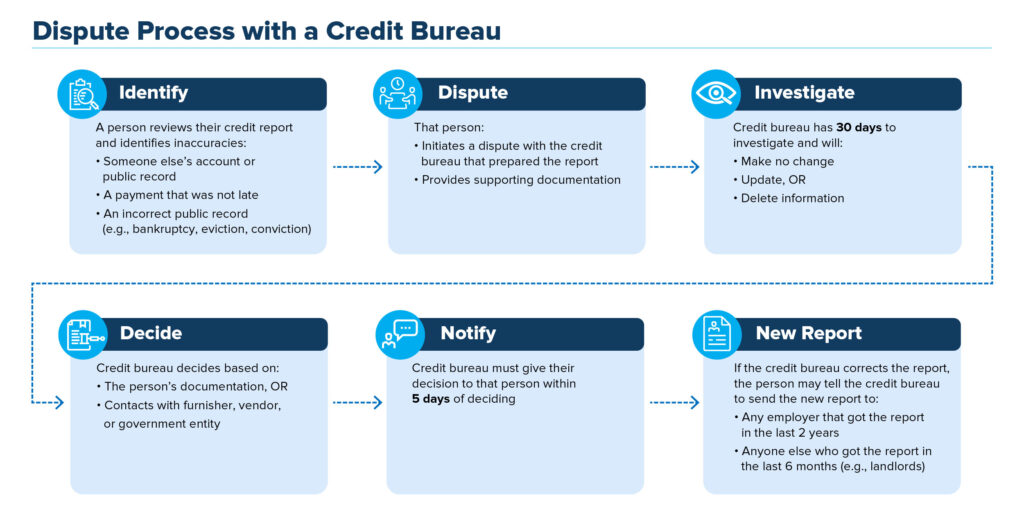If you have discovered errors on your credit report, you may be wondering if you have the ability to dispute them. The good news is that you absolutely can! In fact, it is important to take action if you believe there are inaccuracies on your report, as these errors can have a negative impact on your creditworthiness. In this article, you will learn exactly how to dispute errors on your credit report and the steps you need to take to ensure that they are corrected.
To begin the process of disputing errors on your credit report, you will need to gather evidence to support your claim. This can include any documentation or records that prove the inaccuracies on your report. Once you have the necessary evidence, you can contact the credit bureau that is reporting the errors and formally dispute them. Be sure to provide clear and concise explanations for each mistake and include any supporting documents. The credit bureau will then investigate your claim and, if they find that the errors are indeed incorrect, they will make the necessary corrections to your credit report.

This image is property of www.creditrepair.com.
Understanding Credit Reports
What is a credit report?
A credit report is a detailed record of your credit history. It includes information about your credit accounts, payment history, outstanding balances, and any negative items such as late payments or collections. Credit reports are compiled by credit bureaus, which gather data from various sources such as lenders, creditors, and public records.
Why is it important to check your credit report?
Checking your credit report regularly is important for several reasons. Firstly, it allows you to monitor your creditworthiness and detect any errors or fraudulent activity. Secondly, it gives you an overview of your financial behavior and helps you understand how potential lenders or creditors may perceive you. Lastly, reviewing your credit report can help you identify areas for improvement and take steps to build a stronger credit history.
What information is included in a credit report?
A credit report typically includes the following information:
-
Personal Information: This includes your name, address, date of birth, and Social Security number.
-
Credit Accounts: Your credit report will list all your credit accounts, including credit cards, loans, mortgages, and lines of credit. It will include details such as the account balance, credit limit, payment history, and any late payments.
-
Inquiries: Whenever you apply for credit, the lender will pull your credit report. These inquiries are categorized as either “soft” or “hard” inquiries. Soft inquiries, such as those made by yourself or by potential employers, do not affect your credit score. Hard inquiries, which occur when you apply for credit, can lower your credit score temporarily.
-
Public Records: This section includes information about bankruptcies, tax liens, judgments, and other legal actions that may impact your creditworthiness.
Identifying Errors on Your Credit Report
Types of errors commonly found
Credit report errors can range from simple data entry mistakes to more serious issues such as identity theft. Common errors include:
-
Incorrect Personal Information: Misspelled names, wrong addresses, or incorrect Social Security numbers can lead to confusion and potential credit reporting errors.
-
Outdated Account Information: Closed accounts, outdated balances, or inaccurate payment histories can negatively impact your credit score.
-
Identity Theft: If someone has fraudulently used your personal information to open accounts or make unauthorized transactions, it can appear on your credit report.
-
False or Misleading Public Records: Inaccurate reporting of bankruptcies, tax liens, or court judgments can have a detrimental impact on your creditworthiness.
How can errors impact your credit score?
Errors on your credit report can affect your credit score, which is a three-digit number that lenders use to evaluate your creditworthiness. The impact of errors on your credit score depends on the severity and nature of the mistake. For example, a single late payment that is incorrectly reported as 60 days overdue could significantly lower your credit score.
Why it’s crucial to regularly review your credit report
Regularly reviewing your credit report is crucial for several reasons. Firstly, it allows you to identify and dispute any errors before they have a negative impact on your creditworthiness. Secondly, it helps you detect any signs of identity theft or fraudulent activity. Thirdly, by staying informed about your credit history, you can take proactive steps to improve your credit score and financial health.
Identifying potential errors
To identify potential errors on your credit report, you should carefully review each section of the report. Pay close attention to the following areas:
-
Personal Information: Ensure that your name, address, and other personal information are correct and up to date. Any discrepancies could indicate potential errors.
-
Credit Accounts: Check that all your credit accounts are accurately reported. Look for any duplicate accounts, unauthorized accounts, or incorrect balances.
-
Payment History: Review your payment history to ensure it accurately reflects your payment patterns. Look out for any late payments that you believe were made on time or any missing payments that you believe were made.
-
Public Records: Check for any inaccurately reported bankruptcies, tax liens, or court judgments. These can have a significant impact on your creditworthiness.
Step-by-step Guide to Dispute Errors
Gather necessary documents
Before disputing errors on your credit report, gather all relevant documents to support your claim. This may include copies of billing statements, payment receipts, or any correspondence with the creditor or credit bureau.
Contact the credit bureau
To dispute errors on your credit report, you must contact the credit bureau that provided the report. You can find their contact information on the credit report itself or on their website.
Submitting a dispute letter
In your dispute letter, clearly explain the errors you have identified and provide any supporting documents. Include your contact information and request that the errors be investigated and corrected.
How to dispute errors online
Some credit bureaus offer online dispute platforms where you can submit your dispute electronically. Follow the instructions provided and provide as much detail and supporting documentation as possible.
Timeframe to expect for the resolution
Credit bureaus are required to investigate your dispute within 30 days of receiving it. After their investigation, they will provide you with the results. If the errors are corrected, the credit bureau will send you an updated credit report.
Working with Credit Bureaus
Understanding the role of credit bureaus
Credit bureaus, also known as credit reporting agencies, play a crucial role in maintaining accurate consumer credit information. They collect data from various sources, such as lenders and creditors, and compile it into credit reports. It is important to understand that credit bureaus are responsible for the accuracy of the information they report.
How to contact credit bureaus
There are three major credit bureaus in the United States: Experian, Equifax, and TransUnion. To contact them, you can visit their websites or use the contact information provided on your credit report.
What to include in your dispute letter
When disputing errors with credit bureaus, include the following in your dispute letter:
- Your full name, address, and Social Security number.
- A clear and concise explanation of the errors you have identified.
- Any supporting documentation, such as copies of billing statements or payment receipts.
- A request for the errors to be investigated and corrected, along with your contact information.
Following up on the dispute
After submitting your dispute, it is important to follow up with the credit bureau to ensure that your dispute is being processed. Keep copies of all correspondence and documentation related to your dispute.

This image is property of www.thebalancemoney.com.
Handling Rejected Disputes
Common reasons for rejected disputes
Disputes can be rejected for various reasons, including:
-
Insufficient evidence: If you fail to provide enough evidence to support your claim, the credit bureau may reject your dispute.
-
Frivolous or incorrect claims: If your dispute is deemed frivolous or if the information you are disputing is accurate, it may be rejected.
-
Untimely response: If you do not respond to the credit bureau’s requests for additional information in a timely manner, your dispute may be rejected.
Steps to take when your dispute is rejected
If your dispute is rejected, you have several options:
-
Contact the creditor or lender directly: If the error is related to a specific account, contact the creditor or lender and provide them with the supporting evidence. They may be able to correct the error on their end and update the credit bureaus accordingly.
-
Add a statement of dispute to your credit report: If the credit bureau refuses to correct the error, you have the right to add a statement of dispute to your credit report. This statement will be included in future credit reports and can help explain the situation to potential lenders.
-
Seek legal advice: If your dispute is complex or if you believe you are a victim of identity theft, it may be wise to seek legal advice from a knowledgeable attorney specializing in consumer rights.
Legal rights and next steps
As a consumer, you have legal rights when it comes to disputing errors on your credit report. The Fair Credit Reporting Act (FCRA) ensures that credit reporting agencies and creditors follow certain procedures and investigate your disputes in a timely manner. If you believe your rights have been violated, you may consider filing a complaint with the Consumer Financial Protection Bureau (CFPB) or consulting with an attorney.
Addressing Errors with Creditors
Identifying the creditor responsible for the error
When disputing errors on your credit report, it is important to identify the creditor or lender responsible for the error. This can be done by reviewing your credit report and cross-referencing it with your own records.
How to contact the creditor
Once you have identified the creditor responsible for the error, contact them directly to explain the situation and provide any supporting documentation. This can be done through phone calls, emails, or written letters.
Providing supporting documentation
When contacting the creditor, it is important to provide any supporting documentation that proves the error. This may include copies of billing statements, payment receipts, or any other relevant records.
Negotiating a resolution
When addressing errors with creditors, it is important to remain calm and professional. Clearly explain the error and provide any evidence that supports your claim. Be open to negotiating a resolution that is fair and reasonable for both parties.

This image is property of s3.amazonaws.com.
The Impacts of Disputes on Your Credit Score
Temporary credit score adjustments
When you dispute an error on your credit report, the credit bureau is required to investigate the claim and make any necessary corrections within 30 days. During this time, the disputed item may be temporarily removed from your credit report. This can result in a temporary increase in your credit score.
Long-term effects of successful disputes
If your dispute is successful and the errors on your credit report are corrected, it can have long-term positive effects on your credit score. For example, a late payment that was incorrectly reported can be removed, resulting in an improvement in your payment history and overall creditworthiness.
How disputes are reflected on your credit report
Credit bureaus are required to indicate on your credit report that you have disputed certain items. This is usually done by adding a statement or code to the disputed item, indicating that it is under investigation. This helps potential lenders or creditors understand the context of the disputed information when reviewing your credit report.
Monitoring Your Credit Report
Techniques for ongoing monitoring
To effectively monitor your credit report, consider the following techniques:
-
Regularly review your credit report: Check your credit report at least once a year, if not more frequently, to ensure accuracy and detect any potential errors or fraudulent activity.
-
Set up credit monitoring alerts: Many credit monitoring services offer alerts that notify you of any changes to your credit report, such as new accounts or inquiries. These alerts can help you stay informed and take prompt action if necessary.
-
Monitor your credit card and bank statements: Regularly review your credit card and bank statements for any unauthorized transactions or suspicious activity. Report any discrepancies immediately to the respective financial institution.
Frequency of checking your credit report
Checking your credit report at least once a year is recommended. However, in certain situations, such as when applying for a mortgage or a major loan, it may be beneficial to check your credit report more frequently to ensure that it accurately reflects your creditworthiness.
Choosing credit monitoring services
There are various credit monitoring services available that can help you keep an eye on your credit report. When choosing a service, consider factors such as cost, features, customer support, and reputation.
Protecting your personal information
To protect your personal information and prevent unauthorized access to your credit accounts, consider the following measures:
- Monitor your credit card and bank statements regularly for any unauthorized transactions.
- Keep your Social Security number and other sensitive information secure.
- Be cautious when sharing personal information online or over the phone.
- Use strong, unique passwords for your online accounts.
- Regularly update and run security software on your devices.

This image is property of consumer.ftc.gov.
Seeking Professional Help
Some individuals may need professional assistance
While many individuals can successfully dispute errors on their credit reports independently, some situations may warrant professional assistance. These situations include complex errors, difficulties in communication with credit bureaus or creditors, or concerns about potential violations of your consumer rights.
When to consider hiring credit repair companies
Credit repair companies can assist individuals in disputing errors on their credit reports. Consider seeking their services if you lack the time, knowledge, or persistence to handle the dispute process on your own.
Factors to consider when choosing a credit repair company
When choosing a credit repair company, consider the following factors:
-
Reputation and track record: Research the company’s reputation and customer reviews to ensure they have a positive track record of successfully resolving credit report errors.
-
Transparency and legitimacy: Ensure that the company is transparent in its pricing and services. Avoid companies that promise quick fixes or charge upfront fees.
-
Compliance with regulations: Verify that the company complies with applicable laws and regulations, such as the Credit Repair Organizations Act (CROA).
Understanding the costs and potential outcomes
Credit repair companies typically charge a fee for their services, which can vary depending on the complexity of your case and the services provided. While these companies can potentially help you resolve errors on your credit report, it is important to understand that there are no guarantees. The specific outcome of your dispute depends on various factors, including the accuracy of the information being disputed.
Conclusion
In conclusion, it is possible to dispute errors on your credit report. Regularly reviewing your credit report and identifying potential errors is the first step in the process. By following the step-by-step guide to dispute errors, you can take action to correct inaccuracies and protect your creditworthiness.
Remember to gather necessary documents, contact the credit bureaus, and submit a dispute letter with supporting evidence. It is essential to stay proactive, follow up on your dispute, and be prepared to handle rejected disputes. Addressing errors with the creditors directly may also be necessary, and seeking professional help from credit repair companies is an option for more complex situations.
Disputing errors on your credit report can have positive long-term effects on your credit score and financial opportunities. By monitoring your credit report regularly and protecting your personal information, you can maintain a clean credit report and ensure your creditworthiness for future financial endeavors.

This image is property of consumeractionlawgroup.com.
